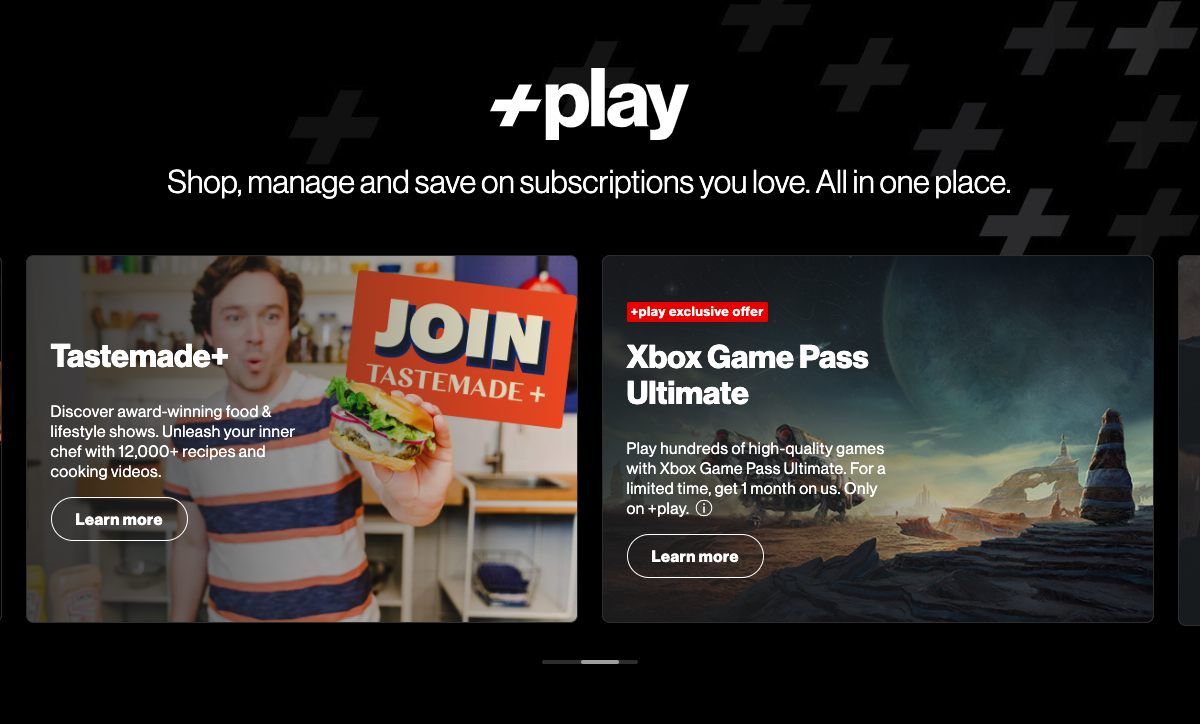You already pay wireless carriers like Verizon or T-Mobile for services like data, voice, and text. But increasingly, you may also start to deal with them when it comes to subscriptions for steaming services, fitness apps, and cloud gaming.
Verizon already offers this through its +Play marketplace of different subscriptions – from Xbox Game Pass Ultimate to Peloton – that can be bundled with its wireless plans. But this just represents the start of what could be a fundamentally different relationship between you and your carrier in the future.
Meet the “super bundle.” The relatively new term describes the burgeoning trend of one company trying to offer multiple services under one house. Verizon’s Play+ is just one example. Amazon is attempting to be a one-stop shop for streaming services with its Prime Channels program, which bundles its own Prime Video with Paramount+, Max, Crunchyroll, and others. Apple is working to turn its own TV app into a hub for other streaming services as well, while Comcast and Charter’s Spectrum have talked about the potential for its Xumo platform to carry other streaming services.
Telecom companies, in particular, are keen to build out their own marketplaces because they already have an existing billing relationship with customers. The idea is that consumers would be more willing to work with one business to manage all of their subscriptions, rather than wrangle a bunch of different accounts and logins.
“People are overwhelmed currently with the number of subscriptions they have, they’re losing control, and that’s creating a really bad feeling which could be described as being overwhelmed or frustrated,” said Giles Tongue, vice president of marketing for Bango, which is a company that helps businesses share subscription programs with each other. “Our data also shows that if you make that easier for the customer, they’ve got better control over their household income.”
There’s also a clear benefit to these companies, with super bundling bolstering customer loyalty by tying together a bunch of different subscriptions. You’re less likely to leave if you’ve got four or five services tied to your Verizon account. These companies also stand to make money by taking a cut of the subscription fee.
Bango released a survey of 100 executives from music, video, and multi-service content providers, and 81% said they saw bundling as the future of their industry, with 69% saying they should bundle services from other industries.
From Perk to Add-On
This shift to focus on bundling can be a bit jarring for wireless customers. AT&T, T-Mobile, and Verizon spent years throwing streaming services on top of wireless as perks, with Verizon offering Disney+, T-Mobile bundling Netflix, and AT&T offering Max. Now they’re starting to sell those services.
“It’s really switching the approach to bundling from, we’re going to use it as a sales promotion to enhance the value of our initial product, to now hey, we can actually drive a long-term relationship with our customer, if we make it easy for them to buy their products and services from us,” Tongue said on the sidelines of Parks Associates’ Future of Video conference earlier this month.
Verizon, in particular, has gone from throwing in freebies to marketing them as add-ons to the core wireless service. While it offers some of the services at a discount or a bundle, some of them go for full price. The options vary greatly, and include everything from YouTube TV to Xbox Game Pass Ultimate and Peloton. The benefit comes from the idea that Verizon can act as the hub for these different kinds of services.
“We owe it to our customers to curate content across different services,” said Jake Cohen, head of business development and strategy for content, during the Parks Associate conference. “+Play was meant to solve that customer pain point.”
Longer term, Tongue said these companies can offer more value by creating tailored bundles of different services to individuals, presumably at a discount.
The question is whether consumers will trust a company enough to let it manage their multiple subscriptions. And if this actually will save them money. Tongue said that Bago has found that ultimately, consumers who feel that they have more control over their subscriptions end up spending more in the end.
“It’s a really interesting paradox,” he said.

